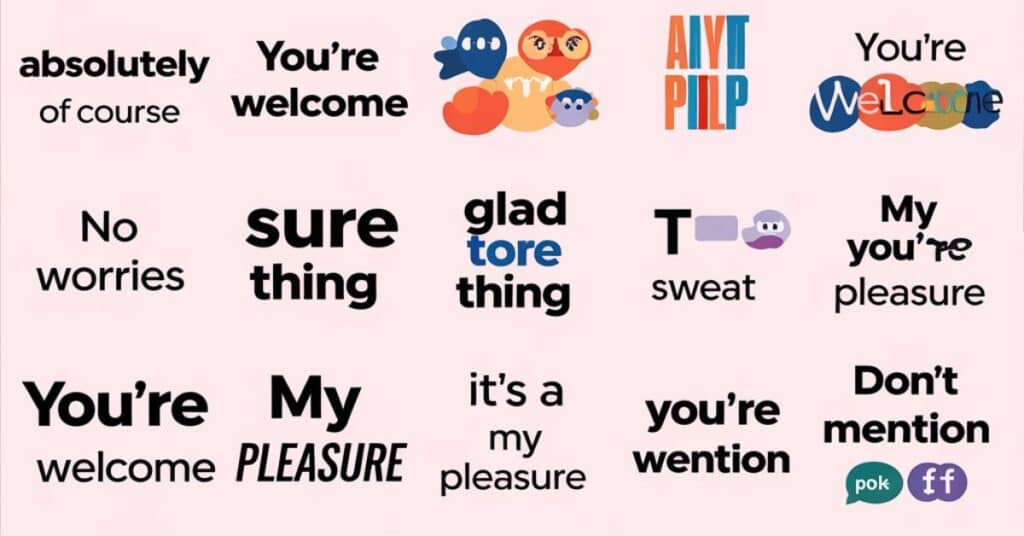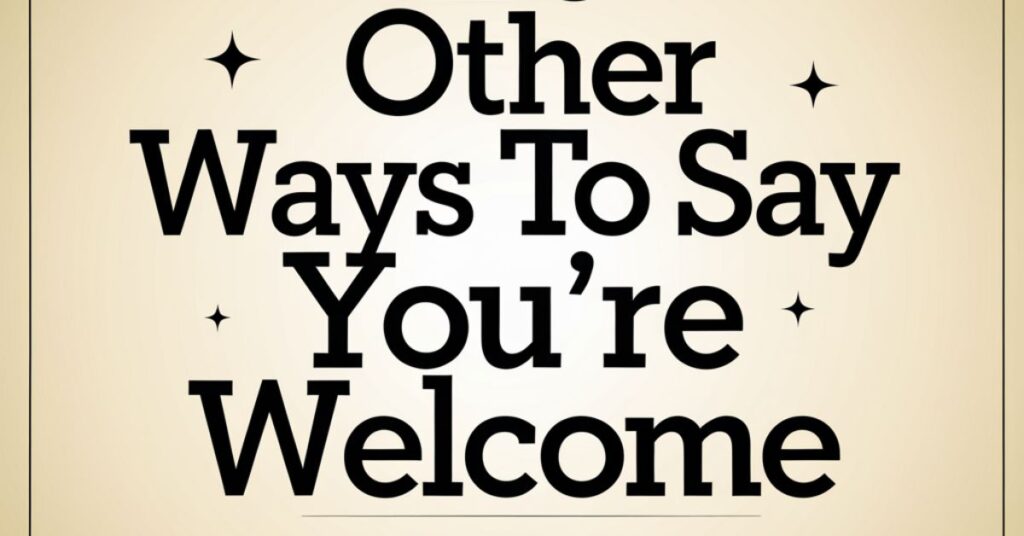In day-to-day communication, saying “You’re welcome” is a common response to being thanked. But relying on the same phrase repeatedly can feel a bit routine. Thankfully, there are plenty of alternative ways to express the same sentiment. Whether you’re aiming for a more formal or casual reply, these 20 ways to say “You’re welcome” can help you vary your vocabulary while maintaining a polite and friendly tone.
Why Use Alternatives to “You’re Welcome”?

Before diving into the alternatives, it’s essential to understand why varying your responses is helpful. Different situations often call for different tones. For example:
- Professional Settings: In a workplace or formal situation, you may want to choose words that sound polished and courteous.
- Casual Settings: With friends or family, your response can be relaxed and easygoing.
- Cultural Sensitivity: In some regions, “You’re welcome” may feel too formal or out of place, depending on the context.
By adding these alternatives to your vocabulary, you can communicate with more precision, authenticity, and variety.
What To Say Instead of “You’re Welcome”
Let’s explore 20 versatile ways to respond to a “thank you” in both formal and informal contexts, complete with usage examples.
1. It’s My Pleasure
Meaning: This response expresses that you genuinely enjoyed helping someone. It’s a bit more formal than “You’re welcome” but still warm.
Example:
Person A: “Thanks for setting up the meeting!”
Person B: “It’s my pleasure.”
2. No Problem
Meaning: Casual and laid-back, “No problem” conveys that the task wasn’t difficult and you were happy to assist.
Example:
Person A: “I appreciate your help with the groceries!”
Person B: “No problem!”
3. Glad I Could Help
Meaning: This phrase conveys a personal connection and reflects your satisfaction in being helpful.
Example:
Person A: “Thanks for fixing my computer!”
Person B: “Glad I could help!”
4. Anytime
Meaning: Short and sweet, “Anytime” implies that you’re always ready and willing to help.
Example:
Person A: “Thanks for taking care of the kids today.”
Person B: “Anytime!”
5. Don’t Mention It
Meaning: A slightly old-fashioned but humble way to say that the favor was minor and requires no thanks.
Example:
Person A: “I appreciate your help with the project.”
Person B: “Don’t mention it.”
6. Happy to Assist
Meaning: A polished, professional response often used in customer service or formal settings.
Example:
Customer: “Thank you for resolving my issue so quickly.”
Customer Support: “Happy to assist!”
7. Not At All
Meaning: This phrase is a more reserved way of saying “You’re welcome.” It suggests that the help provided wasn’t an inconvenience.
Example:
Person A: “Thanks for lending me your book.”
Person B: “Not at all.”
8. The Pleasure Is Mine
Meaning: A formal expression that emphasizes that you were happy to help, often used to reciprocate gratitude.
Example:
Person A: “Thank you for hosting us tonight!”
Person B: “The pleasure is mine.”
9. Think Nothing of It
Meaning: This phrase is a modest way of dismissing the need for thanks.
Example:
Person A: “Thank you for your advice!”
Person B: “Think nothing of it.”
10. My Pleasure
Meaning: A warmer, more personal alternative to “It’s my pleasure,” often used in customer service and hospitality.
Example:
Customer: “Thanks for the excellent service.”
Waiter: “My pleasure.”
11. I’m Glad You Liked It
Meaning: This is a thoughtful response to being thanked for something you contributed to, showing you’re pleased the other person enjoyed or appreciated your effort.
Example:
Person A: “Thank you for the delicious meal.”
Person B: “I’m glad you liked it.”
12. Of Course
Meaning: A confident and sincere reply, often used in casual contexts to show that the help was natural and expected.
Example:
Person A: “Thanks for the ride.”
Person B: “Of course.”
13. You Got It
Meaning: This phrase is easy-going and informal, frequently used in the United States.
Example:
Person A: “Thanks for helping me move the furniture!”
Person B: “You got it!”
14. Sure Thing
Meaning: Casual and friendly, this phrase suggests that the favor was no trouble at all.
Example:
Person A: “Thank you for picking up the package.”
Person B: “Sure thing!”
ALSO READ THIS ARTICLE: Other Ways to Say “You Look Hot” (With Examples)
15. Absolutely
Meaning: Confident and enthusiastic, “Absolutely” is a strong way to affirm that you were happy to help.
Example:
Person A: “Thank you for answering all my questions.”
Person B: “Absolutely!”
16. It Was Nothing
Meaning: A humble and informal response, downplaying the effort it took to help.
Example:
Person A: “Thanks for the advice!”
Person B: “It was nothing.”
17. No Worries
Meaning: Relaxed and informal, this phrase implies that the help didn’t cause any inconvenience.
Example:
Person A: “Thanks for covering my shift.”
Person B: “No worries!”
18. Certainly
Meaning: A polite and formal response, often used in professional or service-related situations.
Example:
Person A: “Thank you for your assistance.”
Person B: “Certainly!”
19. You’re Most Welcome
Meaning: A warmer, slightly more formal variation of “You’re welcome,” adding emphasis to your gratitude.
Example:
Person A: “Thanks for organizing the event.”
Person B: “You’re most welcome.”
20. I’m Here to Help
Meaning: This phrase suggests that helping is part of your role or personality, making it ideal for both professional and personal contexts.
Example:
Person A: “Thanks for all your support.”
Person B: “I’m here to help.”
How to Choose the Right Response
When selecting an alternative to “You’re welcome,” consider the following factors:
| Situation | Appropriate Responses |
| Formal/Professional | “It’s my pleasure,” “Happy to assist,” “Certainly” |
| Informal/Casual | “No problem,” “You got it,” “No worries” |
| Personal | “I’m glad you liked it,” “The pleasure is mine,” “Think nothing of it” |
| Cultural | In some cultures, formal responses like “The pleasure is mine” are common, while casual responses such as “No problem” are more popular in others. |
Tone Matters
Your tone, whether spoken or written, affects how your message is received. Formal settings often call for polished responses, while casual interactions allow for more relaxed and playful options.
Why You Should Diversify Your Responses
Expanding your vocabulary isn’t just about avoiding repetition—it also allows you to:
- Match the Setting: You can adjust your tone for professional, personal, or social contexts.
- Personalize Your Message: Customizing your responses makes conversations feel more sincere and engaging.
- Show Empathy and Consideration: Some phrases convey warmth and gratitude, while others may be more neutral.
Frequently Asked Questions
Why should I use alternatives to “You’re welcome”?
Using alternatives to “You’re welcome” helps diversify your responses, making conversations feel more personable and fitting to the context, whether formal or casual.
Is it appropriate to say “No problem” in professional settings?
In some professional settings, “No problem” can seem too casual. It’s better to use formal.
What is the most formal way to say “You’re welcome”?
“The pleasure is mine” or “It’s my pleasure” are considered formal and polite ways to respond in professional or formal situations.
What’s a casual alternative to “You’re welcome”?
For casual settings, you can use phrases like “No worries,” “You got it,” or “Sure thing” to keep the tone light and friendly.
Can I use “Anytime” as a response to “thank you”?
Yes, “Anytime” is a friendly, informal way to express that you’re always willing to help whenever needed.
Conclusion
While “You’re welcome” is a perfectly polite response to “thank you,” it’s not your only option. By diversifying your responses, you can communicate more effectively and leave a lasting impression. Whether you’re in a formal business setting or chatting with friends, these 20 alternatives offer both flexibility and clarity in communication.
So next time someone says “thank you,” feel free to switch things up with one of these fresh responses. Your conversations will feel more dynamic, and your replies more meaningful!

“Robert Henry is an experienced blogger with a passion for language and education. His insightful posts on Vocab Scope offer readers valuable tips on vocabulary and grammar. With a background in linguistics and a knack for clear, engaging writing, Robert is dedicated to helping others enhance their communication skills.”






